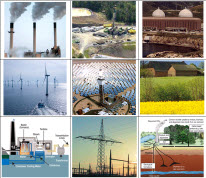|
This is the web site for the
science course Chm286/486. Additional pages are accessible
via the navigation bar on top..
Goals of the course are to help students develop a sophisticated and critical understanding of scientific principles, tasks, and technological realizations of modern energy conversion. The course aims, as well, to provide an appreciation of the impact of energy consumption on the development of civilization, the finite recoverable resources, and the climate of our planet.
Lectures:
Professor
W. Udo Schröder
Lectures on Mondays/Wednesdays 12:30 - 13:45h,
Hylan, Room 102.
First Lecture :
Monday, August 26, 2024
12:30-13:45, Hylan,. Room 102.
This course is intended to be conducted in terms of 2 per week in-person meetings.However, as Campus health concerns may arise this fall, it may have to be given partially in a virtual format, with up to 2 per week on-line lectures on the ZOOM platform. Wearing a properly fitted face mask may be required i n accordance with current UR health/hygiene protocol.
This course follows the UR College Credit Hour Policy for 4-credit courses. The class meets two times per week, each for 1.5 academic hours. The course also includes regular out-of-class reading and preparatory assignments. Students are encouraged to use regular office hours held by instructor and TA, which are meant to answer questions and/or help students with reading, homework and projects. Additionally, students are also expected to complete an additional 8 hours of supplementary work per week on sets of homework and research for 2 research papers.
Office Hours
W.
Udo Schröder:
Tuesdays, 12:00 - 1:30 p.m., or, by appointment (275-8263), schroeder@chem.rochester.edu
Hutchison Hall (HH)
466
Teaching Assistant, TBA
Hutchison Hall, Wednesdays, TBA, or by appointment.
Prerequisites
Familiarity
with basic calculus, principles of modern physics and chemistry, or by special permission
Synopsis of Concepts
The Big Picture: Energy and the Environment
Sustainability, external costs of energy management,
History of energy use and technologies in illustrations.
Work and Energy, the Basic Science
Equivalent forms of work, energy, power, energy units,
Energy balance in material transformations,
Fundamentals of thermodynamic engines, electricity generators.
Renewable Energy Technologies and their Scientific Foundation
Solar concentrated (thermal), geothermal energy conversion,
Physics and chemistry of photovoltaic solar cells,
Basic hydrodynamics of working media,
Wind power generation, hydro-powerplants,
Hydropower resource development.
Conventional Energy Technologies, Use and Outlook
Energy from Biomass and synthetic fuels
Fossil fuel demand and resources
Thermal power plants, reciprocal engines, internal combustion
Steam turbines and thermal power plants, efficiencies
Power from Nuclear Transmutation
Basic nuclear energetics of fission and fusion of atomic nuclei,
Radioisotope thermoelectric generator (RTG, RITEG),
Nuclear fission power plants, new generation plants,
Prospects of nuclear fusion power,
Radiation hazards, power plant safety/accidents.
Fuel and Energy Distribution Infrastructure
Fuel transport, electrical grid (dumb and smart), cyber security,
Electrical grid stability issues,
Energy storage technologies,
Energy markets.
External cost of energy utilization
Atmospheric science foundation of Greenhouse Effect,
Anthropogenic influences on pollution, and climate change. Extreme weather events,
Depletion of resources, storage/deposition of waste.
Energy Strategies: Potential and Risks
Risk factors for environment, health and climate, hydrocarbon fuel technologies (clean coal, CCS, shale, synfuels),
Nuclear power (new nukes, fusion), development of renewable energy sources, energy efficiency, conservation.
Energy Policies vs. Public Attitudes
Public attitudes toward renewable-energy and nuclear power
Selective subsidies of energy technologies, energy conservation strategies,
Prospects of changing public attitudes through education
Reference Materials
For a review of technical topics covered in the
course use the text
"Energy Science. Principles, Technologies, and Impacts."
by John Andrews & Nick Jelley (required)
and, as an auxiliary reference the freely available (recommended)
"Sustainable Energy - Without the Hot Air," by David J.C. MacKay,
The latter is available as e-book for free download (www.withouthotair.com)
Several
copies of reference books are on 2-hr Reserve in Carlson Library.
Assignments/Grades
Asignment include regular weekly homework problem sets and 2-3 research papers.
The grades will be computed from homework (25%) and 2 research project reports (75%).
For graduate students, project scopes are extensive and include classroom presentations with Q&A on one project. >>>> There are no written exams.
Disclaimer
|
